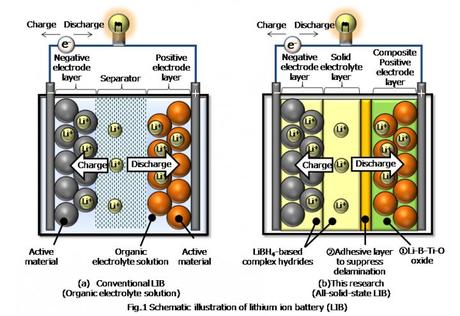Hitachi develops thermally durable solid-state Li-ion battery

Hitachi, in collaboration with Tohoku University researchers, has developed a technology to reduce the internal resistance of the all-solid-state Li-ion battery using a complex hydride*1 as a solid electrolyte.
The reduction improves the charge-discharge performance of the all-solid-state Li-ion battery, resulting in the batteries successfully operating at temperatures as high as 150°C, with a discharge capacity of 90% of theoretical value.
The technology can be used in a wide variety of applications, such as large-scale industrial machines with motors and medical machines that need to be heated for autoclave sterilisation. Since this technology does not require the cooling system common in conventional Li-ion batteries, it is expected to lead to further developments of compact battery systems and reduce overall costs. The high energy density Li-ion batteries are already being used as power sources in applications such as portable devices (smartphones and tablets) and electric vehicles, and adjustor of the supply and demand of renewable energy.
An issue of the conventional Li-ion battery, with the organic electrolyte solution, is thermal durability. The upper operating temperature is limited to around 60°C owing to volatility of the organic electrolyte solution. Consequently, it is difficult to use the conventional Li-ion battery in a high temperature environment without a cooling system.
Therefore, the solid electrolyte with no volatility has been developed for the use of the Li-ion battery in a high-temperature environment. The lithium-ion conductivity of solid electrolyte, however, is lower than that of the organic electrolyte solution, and the internal resistance of the all-solid-state Li-ion battery should be reduced for its commercialisation.
Professor Shin-ichi Orimo’s lab in AIMR and the Institute for Material Research at Tohoku University have been conducting research on LiBH4-based complex hydrides as novel and solid electrolytes. They have confirmed the fast lithium-ion conductivity in the wide temperature range from room temperature to 150°C.
Computational model enhances battery safety
Researchers have developed a new computational model that offers insights into one of the key...
Novel method to extend lifecycle of Li-ion batteries
Researchers have uncovered a hidden surface degradation mechanism in the cathodes of lithium-ion...
Sensor could help prevent Li-ion battery fires
Researchers have developed new technology to detect dangerous gas leaks in lithium-ion batteries,...





